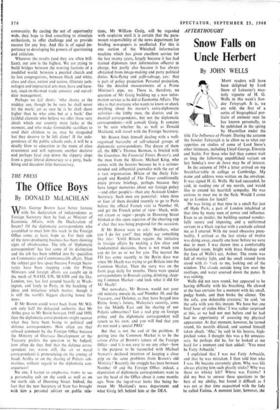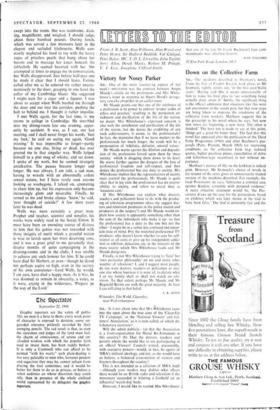Snow Falls on Uncle Herbert
AFTERTHOUGHT
By JOHN WELLS
MANY readers will have been delighted by Lord Snow of Leicester's mas- terly vignette of H. G. Wells in this week's Sun- day Telegraph. It is, we are told, the first of a series of biographical por- traits of eminent men he
C&. has known personally, to be published in the spring
by Macmillan under the title The Influence of People. During the autumn the Sunday Telegraph is to allow us to whet our appetites on studies of some of Lord Snow's other intimates, including Lloyd George, Einstein and Stalin. For those who feel they cannot wait so long the following unpublished variant on last Sunday's tour de farce may be of interest.
In the autumn of 1934 a letter arrived on my breakfast-table in college at Cambridge. My name and address were written on the envelope. It was signed H. G. Wells. He had succeeded, he said, in reading one of my novels, and would like to extend his heartfelt sympathy. He was curious to meet me in the flesh. Would I come up to London for lunch?
He was living at that time in a small flat just off Hyde Park, a part of London inhabited at that time by many men of power and influence. Even to an insider, the building seemed wonder- fully secure and imposing, and a uniformed servant in a black top-hat with a cockade saluted me as I entered. With my usual obsessive punc- tuality, I arrived as the last stroke of twelve was dying away, exactly one hour before we were due to meet. I was shown into a comfortably furnished room, bright with brass firedogs and the face of Wells's cat, Arthur. The room was full of murky light, and the small rotund form stood with its back to me, looking out of the window. The clouds outside hung low over the rooftops, and water coursed down the panes. It was raining.
Wells did not turn round, but appeared to be having difficulty with his breathing. He clawed at the lace curtains for a moment with his small, pudgy hands, and then broke the silence. 'On the sofa, you delectable creature,' he said, 'on the sofa with you this instant. We have but one brief hour of stolen bliss.' I was rather surprised at this, as we had not met before and he had had no opportunity of assessing my physical appearance. At that moment, however, he turned round, his nostrils dilated, and seemed himself taken aback. `Aha,' he said in his hoarse, high- pitched voice. I thought this was a bit unneces- sary. So perhaps did he, for he looked at me hard for a moment and then added: 'You must be Fatty Arbuckle.'
I explained that I was not Fatty Arbuckle, and that he was mistaken. I then told him who I was. He became extremely glum. Why was life always playing him such ghastly tricks? Why was there no whisky left? Where was Fatima? I did my best to answer these questions to the best of my ability, but found it difficult as I was not at that time acquainted with the lady he called Fatima. A moment later, however, she
swept into the room. She was• handsome, dash- ing, magnificent, and weighed, I should judge, about three hundred pounds. During lunch, which was served a few moments later in the elegant and secluded kitchenette, Wells con- stantly neglected his food to toy with the heavy ropes of priceless pearls that hung about her bosom and to massage her knees beneath the tablecloth. He seemed besotted with her. She attempted at times to engage me in conversation, but Wells disapproved. Just before half-past one he made it clear that I should leave. Fatima called after me as he ushered me rather uncere- moniously to the door, grasping in one hand the collar of my Cambridge blazer. She suggested I might care for a cigar and a liqueur. I was about to accept when Wells hustled me through the door and out into the corridor, pushing the bolt to behind me. I thought it rather impolite.
I met Wells again, for the last time, in my rooms in college in Cambridge. He stumbled into my dining-room late one evening, appar- ently by accident. It was, as I say, our last meeting, and I shall never forget his words. 'Just my luck,' he said on seeing me again, 'Good evening.' It was impossible to forget—partly because no one else, living or dead, has ever greeted me in that singular way. Wells helped himself to a pint mug of whisky, and sat down. I spoke of my work, but he seemed strangely untalkative. The pauses became longer and longer. He was always, I am told, a sad man, having to wrestle with an abnormally ardent sexual nature, but I have rarely seen anyone looking so woebegone. I talked on, attempting to cheer him up, but his expression only became increasingly glum and miserable. Finally, he turned to me and broke silence. 'Snow,' he said, 'ever thought of suicide?' A few short years later he was dead.
Wells was most certainly a great man. Prophet and teacher, scientist and novelist, his works were widely read in the Soviet Union. It must have been an unending source of distress to him that his genius was not rewarded with those insignia of merit which a grateful nation is wise to lavish upon her most deserving sons, and it was a great grief to me personally that, despite months of quiet campaigning in the drawing-rooms and in the clubs, I was unable to achieve any such honour for him. If he could have died Sir Herbert, or even—though he dared not perhaps aspire so high, even in the secrecy of his own conscience—Lord Wells, he would, I am sure, have died a happy man. As it was, he was doomed to remain in obscurity, a voice, as it were, crying in the wilderness, 'Prepare ye the way of the Lord.'



































 Previous page
Previous page